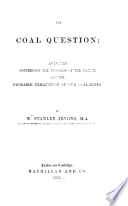Quotes from book
The Coal Question

The Coal Question; An Inquiry Concerning the Progress of the Nation, and the Probable Exhaustion of Our Coal Mines is a book that economist William Stanley Jevons wrote in 1865 to explore the implications of Britain's reliance on coal. Given that coal was a finite, non-renewable energy resource, Jevons raised the question of sustainability. "Are we wise," he asked rhetorically, "in allowing the commerce of this country to rise beyond the point at which we can long maintain it?" His central thesis was that the supremacy of the United Kingdom of Great Britain and Ireland over global affairs was transitory, given the finite nature of its primary energy resource. In propounding this thesis, Jevons covered a range of issues central to sustainability, including limits to growth, overpopulation, overshoot, energy return on energy input , taxation of energy resources, renewable energy alternatives, and resource peaking—a subject widely discussed today under the rubric of peak oil.

The Coal Question (1865)
Context: It is very commonly urged, that the failing supply of coal will be met by new modes of using it efficiently and economically.... It is wholly a confusion of ideas to suppose that the economical use of fuel is equivalent to a diminished consumption. The very contrary is the truth.

The Coal Question (1865)
Context: The alternatives before us are simple. Our empire and race already comprise one-fifth of the world's population, and by our plantation of new states, by our guardianship of the seas, by our penetrating commerce, by the example of our just laws and firm constitution, and above all by the dissemination of our new arts, we stimulate the progress of mankind in a degree not to be measured. If we lavishly and boldly push forward in the creation and distribution of our riches, it is hard to over-estimate the pitch of beneficial influence to which we may attain in the present. But the maintenance of such a position is physically impossible. We have to make the momentous choice between brief greatness and longer continued mediocrity.

The Coal Question (1865)
Context: Commerce is but a means to an end, the diffusion of civilization and wealth. To allow commerce to proceed until the source of civilization is weakened and overturned is like killing the goose to get the golden egg. Is the immediate creation of material wealth to be our only object?